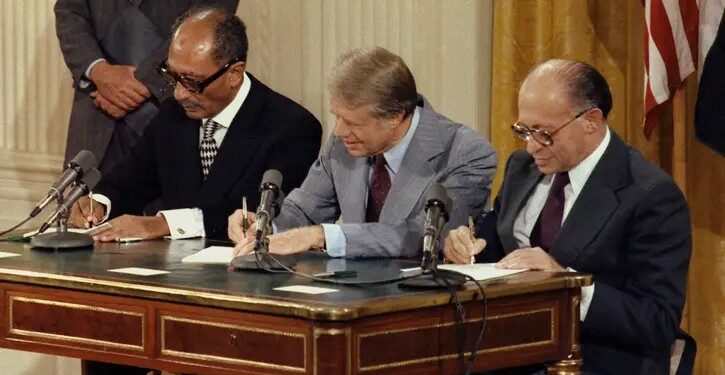The Camp David Accords, signed in September 1978, marked a historic turning point in Middle East diplomacy, bringing Israel and Egypt closer to peace after decades of conflict. The agreements, brokered by US President Jimmy Carter at the Camp David presidential retreat in Maryland, laid the foundation for the first peace treaty between Israel and an Arab state.
The road to Camp David
The accords followed years of violent confrontation between Israel and its Arab neighbours, including the Yom Kippur War of 1973. Egyptian President Anwar Sadat’s groundbreaking visit to Jerusalem in 1977 demonstrated a willingness to pursue negotiations, creating a political opening. Carter seized the moment, inviting Sadat and Israeli Prime Minister Menachem Begin to the secluded Camp David retreat for intensive talks.
Two agreements at the core
After 13 tense days of negotiation, the parties signed two frameworks. The first outlined a peace process for the West Bank and Gaza, envisioning Palestinian autonomy over five years. The second laid the groundwork for a bilateral peace treaty between Israel and Egypt. The accords included provisions for Israel’s withdrawal from the Sinai Peninsula, which had been occupied since the 1967 Six-Day War, in exchange for full recognition of Israel by Egypt.
Immediate consequences
In 1979, the accords culminated in the Egypt–Israel Peace Treaty, making Egypt the first Arab country to officially recognise Israel. This was a diplomatic breakthrough but also a source of division. Many Arab states condemned Egypt, suspending it from the Arab League and isolating Sadat politically across the region. Domestically, Sadat faced growing opposition that would eventually contribute to his assassination in 1981.
A legacy that endures
The Camp David Accords remain one of the most significant achievements in US-led diplomacy in the Middle East. While the Palestinian autonomy framework stalled and never materialised as envisioned, the peace between Egypt and Israel has endured for more than four decades. The accords also set a precedent for later negotiations, including the Oslo Accords of the 1990s.
Implications for regional politics
By demonstrating that negotiations could succeed between long-standing adversaries, the accords reshaped regional dynamics. For Israel, they secured peace on their southern border. For Egypt, they returned the Sinai and improved ties with the US, bringing substantial economic and military aid. Yet unresolved questions around Palestinian self-determination ensured that the broader Arab–Israeli conflict continued.
REFH – Newshub, 17 September 2025



Recent Comments